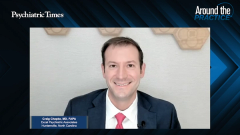
Diagnosing Adults With ADHD Based on Patient Presentation
Drs Stephen Faraone, Theresa Cerulli, Craig Chepke, and Andrew J. Cutler discuss how to diagnose adults with ADHD based on patient presentation.
Episodes in this series

Stephen Faraone, PhD: Andrew and Craig, jump in and talk about what do you do when an adult comes into your office with, think they have ADHD symptoms, you can document that but you're having a hard time documenting a childhood onset. Let me first ask Craig, what do you, what do you do about that?
Craig Chepke, MD, FAPA: That's a situation I see in practice all the time, in fact, many times, the patient doesn't even come in for, because of ADHD, they come in saying that they have depression or anxiety, and I just, I can smell it, the ADHD is in the back of my neck, stand up, and I just get the feeling by listening to this person's thought process, that they have ADHD. And I become like a detective, archaeologist, trying to reconstruct that childhood history, and I find that it often is there. What I like to say is that they kind of brute force there, brute forced IQ'd their way through it, they were maybe smart, had some resources, parents that were supportive, maybe could get them into schools that had a good staff to student ratios, tutors, they had certain advantages, and also they probably worked 2 or 3 times harder than the neurotypical children to get to those same kinds of results. Looking back and figuring out, what did it look like when you studied? Did you have 2 or 3 different textbooks out at the same time while you had a TV on and the radio? Well, if that seems normal to you, then you might have had ADHD and you just didn't realize because you didn't know any different, looking for what they thought was normal but that we realize, as clinicians, is more consistent with an ADHD pattern and how they were able to compensate for it is how I look for that diagnosis.
Andrew J. Cutler, MD: You know, this is an area where I think DSM-V also helped us, and that is raising the age at which you need to have shown onset of symptoms from before the age of 7 up to the age of 12. It's very hard for adults to describe what they were like when they were four and 5 years old, and I love Craig's analogy of being an archaeologist, it's hard sometimes to document that for people to be able to tell you more about what they were like in their twin years, you know, that kind of thing. The other thing, quickly, is, something that differs is, very often when kids present, it's for ADHD, and pretty much that's what they're presenting with, that's what their complaint with, because there's problems with school or behavior. Adults, as Craig said, are usually not presenting with ADHD, sometimes they go, I think I have ADHD, very often they're presenting with the comorbidity first. Kids, ADHD and then I look for the comorbidity, in adults, often the other way around.
Theresa Cerulli, MD: And the other challenge with the adults is that usually you're just getting information from the patient who's in front of you, you don't have as much opportunity to get observer input, so the adult probably isn't bringing in their spouse in, to the assessment evaluation, whereas with kids, we at least have some of the advantages of hearing from the parents or teachers or other observers of the child's symptomatology, the poor adult with ADHD might not only have trouble remembering what it was like for them in childhood, but they also don't have someone with them to report the symptoms as seen through their spouse's eyes, for example. It is often an added challenge with the adult patients.
Stephen Faraone, PhD: That's right, and I think we should add a little bit to let our listeners know that the age of onset, the current age of onset of 12, in the DSM, is of course arbitrary, they had to pick a number, but there's no switch in the brain that turns off at age 12 and says you can no longer have ADHD, but I of course would warn listeners that, when you diagnose people with later onset of ADHD, just be very careful and do a much better work of their current condition, I'm sure all of you have seen patients who come in and looks like they maybe have onsets of 18 or 19, can you comment on what you do on those cases?
Andrew J. Cutler, MD: Well, I usually think that it's there, I think Craig said it extremely well, I had a professor who used to say, IQ points can compensate for a lot, and a lot of times these kids are very bright and, one of the things I look for, too, is underachievement, not meeting their potential, maybe this is a kid who has off the charts IQ, but they're getting Bs, you know, that's not appropriate for them, I would say, but maybe have somebody with a parent who is extremely organized and able to really help compensate and then, it's only when the person gets out into the real world or into college and they have to start managing things that things show up, so, I dig pretty hard and I just suspect it's there.
Stephen Faraone, PhD: You know, that's a great point, because I've had, I've had more than a few colleagues tell me that this patient thinks he has ADHD, but went to medical school or went to law school, he's a high achiever, how can he possible have ADHD? And the answer is, there's actually a lot of research out there, some of which I did, which shows that people who have high IQs and ADHD, they're doing worse in life than people with high IQs who don't have ADHD, and they do need help, they should, people, we shouldn't discriminate against high IQ people because they are good achievers, because they can do better if they're properly treated.
Andrew J. Cutler, MD: I think it's important to take into account compensation-
Stephen Faraone, PhD: Compensation, yes. Craig had mentioned that social, emotional, intellectual scaffolding that scaffolds the patient in their early years and then, when they leave the home, some of that scaffolding falls apart and they fall with it, for sure.
Transcript edited for clarity
Newsletter
Receive trusted psychiatric news, expert analysis, and clinical insights — subscribe today to support your practice and your patients.












